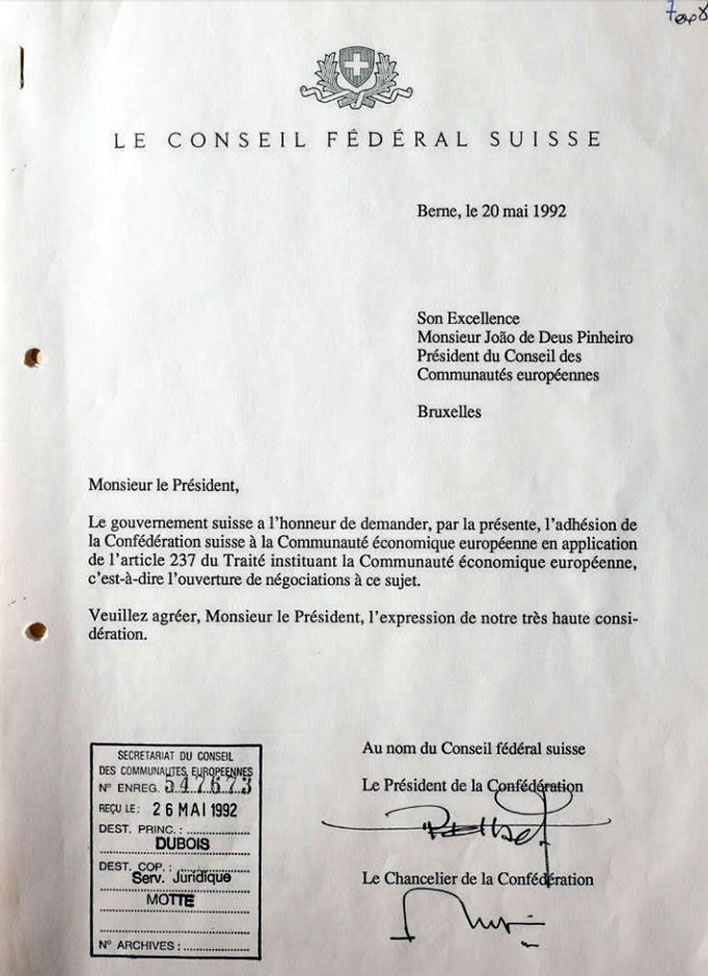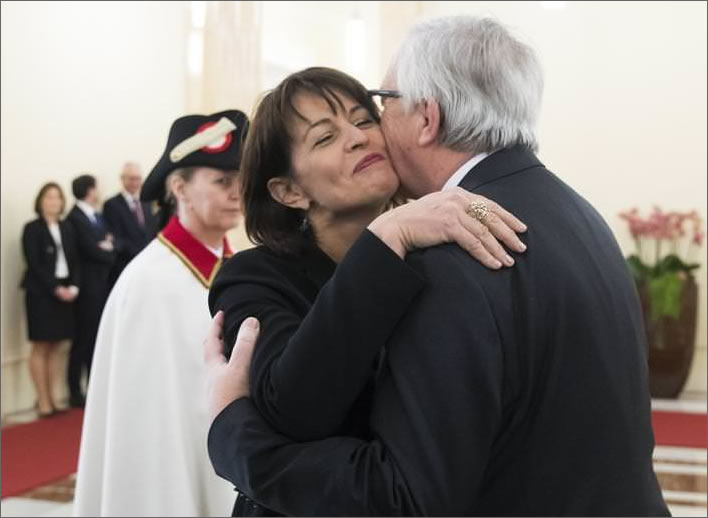17 May, decision time for Switzerland
Posted by George Meredith on UTC 2020-02-01 13:12
In 1992 the Swiss government sent in a letter of application to join the EEA, the precursor of the European Union. This letter of application was never formally withdrawn and remained in a filing cabinet in Brussels until quite recently. The longevity of its presence is a symbol for the suppressed European ambitions of the Swiss political and economic elites.

An image of the Swiss application to join the EEC/EU. Image NZZ
Unfortunately for the elites of the time, Swiss direct democracy kicked in and a referendum on the subject was held in 1992. The forces wishing to preserve the nation state of Switzerland prevailed – although not by much – the application to join was quietly stuffed into a file and the subject of EU membership was off limits for nearly a decade. In a referendum in 2001 voters rejected another proposal to join the EU (as it had then become), and that seemed to be that.
That could never have been that, because Switzerland is a landlocked speck of around six million people surrounded by EU statelets: France, Germany, Italy and (later) Austria. The vast majority of its trade was with the countries of the EU. Geographically, mountainous Switzerland was an annoying speed bump on the interstate transport routes of the EU. As wealth, prosperity and trade grew, lorries got bigger and more numerous, motor vehicle ownership expanded, the interdependencies got ever closer.
During these thirty years the co-existence between Switzerland and the EU has been managed through individual bilateral treaties governing regulatory alignment in particular sectors. There are currently more than a hundred of these treaties and they are an administrative and political nightmare for both sides. Both Switzerland and even more so the EU are changing year by year and the treaties have to change with them. On top of the political changes come the great technological and social changes of recent years.
Thus these bilateral sector treaties require constant revision and change management. These revisions are not simply administrative tweaks either – the changes often go to the very basis of the political relationship between the two partners. These agreements are the unacceptable face of regulatory alignment without belonging. Britain, take note.
The EU and Switzerland have had enough of this political fudge from the nineties. The political elites have come up with a 'Framework Agreement' that is, in effect, the anteroom for full membership. Whatever alternative terminology Swiss politicians use, that is what it is. The Single Market is totalitarian: access to it requires obeisance to its rules and conformity with its nature. Michel Barnier, in response to a journalist's question at a recent press conference, said 'There will never be any compromise on the Single Market – never, never, never'. What is sauce for the British goose is sauce for the Swiss gander.
The Swiss are now beginning to wake up to the extent of the loss of sovereignty that is ahead of them if they sign up to the Framework Agreement. If Switzerland wants to have a relationship with the EU it will have to be on the EU's terms, accord with all the EU's rules and be justiciable in the EU's courts.
Observers have already seen the cracks spreading in particular areas: financial harmonisation, freedom of movement, migration, even energy sharing. For several years now Switzerland has been paying Danegeld to the EU in the form of 'cohesion' payments for infrastructure projects in the underdeveloped corners of the EU. As inevitably happens to all ransom victims, the demands are being increased. The talk now is that Switzerland will help the EU out financially with its European Green Deal, a suggestion that has come from the terrified Swiss side, obviously suffering from a political Stockholm Syndrome disguised as Swiss compromise.

The Stockholm Syndrome made manifest when Jean-Claude met Doris (2017). Two Presidents at it in broad daylight. Even the usher has that 'get a room expression' on her face. Perhaps she is just thinking 'I'll have what she's having'. Image: NZZ / Peter Klaunzer / Keystone.
In such ways are the Swiss elites trying to get the Framework Agreement watered down. But there are no grounds for hope that the EU will bend its sacred Single Market principles in the slightest to let plucky little Switzerland off the hook. After all, the EU has nothing to lose, plucky little Switzerland, on the other hand, has an awful lot to lose.
EU Referendum number three
The problem will have to be addressed openly after 17 May this year, when the Swiss will toss the dice in the air and have a referendum to let voters decide what to do.
The EU has already said that there will be no more negotiations on the Framework Agreement, merely a few 'clarifications' may be made at the most – a position that will be familiar to Brexiteers in the UK. For months now the members of the Swiss government have hidden behind vacuous and ambiguous utterances to avoid taking a position at all – also something that will be familiar to the British. The crunch will come on 17 May.
There have already been some warning cracks of the whip – Swiss financial institutions and electrical energy sharing – but the one that may serve really to concentrate Swiss minds has just been announced today. Nine days after the referendum, the important treaty covering medical technology expires.
This is a key treaty that directly affects 1,400 Swiss companies with over 58,000 employees and a total turnover of nearly 16 billion CHF, most of it from exports to the EU. If the arrangements in this treaty are not extended then these companies will lose their easy access to the EU Single Market and will wonder why they are located in Switzerland when their biggest customers are all in the EU. The EU has stated that unless there is real progress on the Framework Agreement, they will simply let this treaty run out.
In the course of the coming year, Britain will face many similar questions as part of its conscious decoupling from the EU. The UK is nearly ten times bigger than Switzerland, it is true, but despite all the windy talk of the buccaneering British spirit gaining access to new markets, not losing the existing ones in the EU will have to be a major consideration.
0 Comments UTC Loaded:
Input rules for comments: No HTML, no images. Comments can be nested to a depth of eight. Surround a long quotation with curly braces: {blockquote}. Well-formed URLs will be rendered as links automatically. Do not click on links unless you are confident that they are safe. You have been warned!